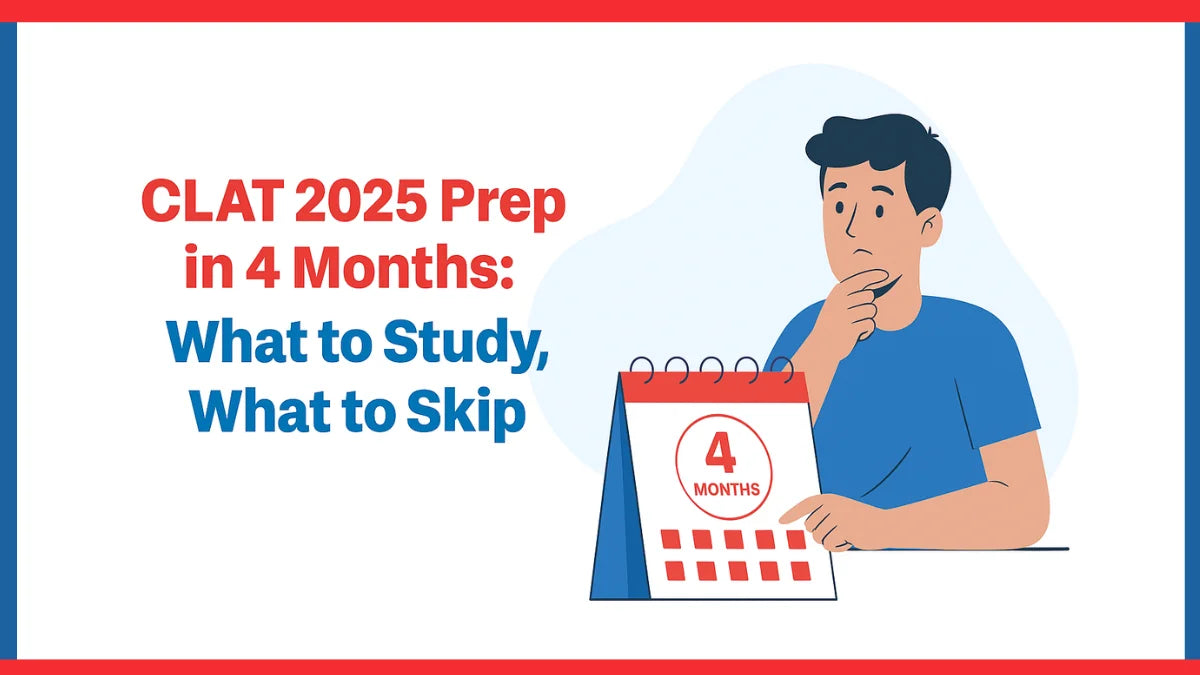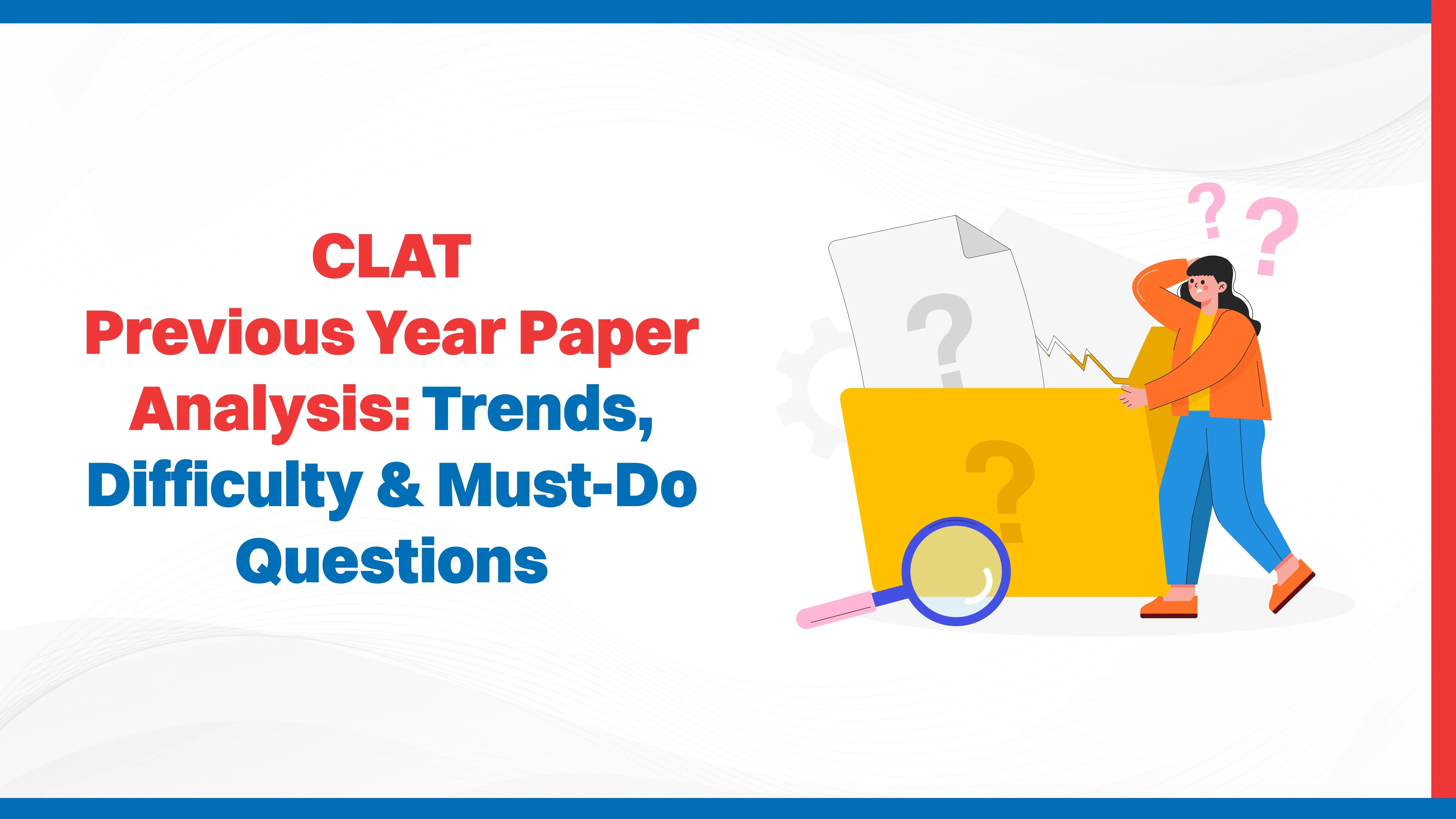The Common Law Admission Test (CLAT) preparation may sometimes be an overwhelming experience. It is not unusual to find the aspirants lost in the middle of the preparation process due to the intense competition, large syllabus, and the pressure of performance. You are reading this, so you probably have some of that anxiety as well. However, there is no need to worry, you are not alone and, what is more important, you are not lost.
Not only will this realistic and well-organized study guide provide you with a clear picture, it will also assist you in drawing up a plan that is practical, flexible, and that will fit your own unique learning pace. This guide will get you back on track, whether you are a novice or you are stuck in the middle.
Learning the CLAT Syllabus First
It is essential to appreciate what you are going to train before you start to practice intensively or simply grab books. CLAT is a test of aptitude and not a test of memory. The test contains five major parts:
|
Section |
Focus Area |
Number of Questions (Approx.) |
|
English Language |
Comprehension, vocabulary, grammar, inference |
28-32 |
|
Current Affairs & GK |
Static GK + Current Events |
35-39 |
|
Legal Reasoning |
Legal principles, logic, and application |
35-39 |
|
Logical Reasoning |
Arguments, assumptions, conclusions |
28-32 |
|
Quantitative Techniques |
Basic maths (10th level), data interpretation |
13-17 |
You do not require a law background or a strong knowledge of math to crack CLAT, but you require strategy, regularity, and the appropriate CLAT books to be your guide.
Feeling Lost? Here's Why That Happens in CLAT Prep
There are a couple of reasons why many students feel stuck or demotivated:
1. Unrealistic Schedules: Attempting to complete the full syllabus within 1 month, and at the same time, attending school, coaching, or board exams.
2. No Prioritization: The ignorance of which section is more important or takes more time to master.
3. Excessive Resources: An abundance of CLAT preparation books and no study plan.
4. Mocks: Non-observance of CLAT mock test papers, which are important in real-time exam practice.
5. Peer Comparison: Worrying about the amount of studying other people are doing instead of worrying about personal improvement.
Flexible and Adaptive Realistic 6-Month CLAT Study Plan
This table shows a practical division of topics and time in case you start 6 months before the exam. In case you are short of time, adjust the time per phase accordingly.
|
Phase |
Time Duration |
Focus Area |
Goal |
|
Phase 1 |
1 Month |
Understand the syllabus, start reading, basics |
Build a reading habit, start slow |
|
Phase 2 |
1.5 Months |
Deep dive into English, Legal, and GK |
Read editorials daily, and solve case laws |
|
Phase 3 |
1.5 Months |
Logical and Quantitative Techniques |
Strengthen logic + speed + accuracy |
|
Phase 4 |
1 Month |
Start full-length CLAT mock test papers |
Apply learning in a simulated environment |
|
Phase 5 |
1 Month |
Revise, refine weak areas, and attempt 10+ mocks |
Final preparation phase |
Use your own pace. Don’t just focus on how much you’re studying—focus on how well you are retaining and applying what you’ve studied.
What Are the Best Strategies to Study English for CLAT?
CLAT English isn’t about solving grammar rules blindly. The passages are comprehension-heavy and require inference-based understanding. Focus on:
-
Reading editorials (The Hindu, Indian Express) to build vocabulary and inference skills
-
Noting down unfamiliar words and revising them weekly
-
Solving passage-based questions from CLAT books or previous year papers
The goal should be not just to read, but to comprehend and apply. English prep becomes easier when reading becomes a habit.
How Much GK Should I Prepare for CLAT?
CLAT GK section includes both static and current affairs. But what’s more important is the way questions are asked.
Instead of memorizing dates and names, focus on reading editorials, monthly current affairs digests, and understanding the “why” behind each event.
For example, don’t just remember “WHO declared COVID a pandemic on March 11, 2020”. Understand the implications, background, and global response.
In short, depth over quantity. And don’t skip it—GK carries high weightage and often decides the topper.
Are Mock Tests Really That Important?
Yes. And here’s why.
|
Benefits of Mocks |
Impact on CLAT Preparation |
|---|---|
|
Builds Stamina |
Trains your brain for a 2-hour high-pressure test |
|
Identifies Weak Areas |
Shows which section needs more focus |
|
Enhances Time Management Skills |
Helps plan how much time to spend per section |
|
Simulates Exam Environment |
Reduces exam-day anxiety and boosts confidence |
Attempt at least 30-40 full-length CLAT mock test papers before the exam. Don’t wait until you’ve “finished” the syllabus. Start early and gradually improve.
What to Do When You’re Feeling Burnt Out?
It’s natural. The process of CLAT preparation can become mentally straining, particularly in combination with school or other tests.
This is what can be helpful:
• Take a 24-hour break guilt-free
• Go back to the reason you want to do law
• Review easier subjects to regain speed
• Consult a friend, mentor, or a coach
It may happen that even reading inspirational accounts of past CLAT toppers can bring that fire back. Simply do not quit. Burnout is not permanent- your dreams are.
How to Choose the Right CLAT Books?
There are dozens of guides, YouTube channels, and PDFs, and aspirants spend too much time changing between them. It is important to select fewer resources and adhere to them religiously.
Your books on CLAT must:
• Cover new pattern-based questions
• Introduce practice in case-based legal reasoning
• Give passages to understand in the actual CLAT pattern
Once you finalize your CLAT preparation books, don’t jump from book to book. Consistency is more important than variety.
Do I Need a Coaching Institute to Crack CLAT?
This is one of the most searched questions among CLAT aspirants. And the answer isn’t one-size-fits-all.
If you:
-
Struggle with consistency
-
Need structured guidance
-
Perform better in peer-based environments
Then, a good coaching institute or online batch may help. But even if you’re doing self-study, with strong discipline and the right CLAT books, you can crack the exam.
What matters more than the institute is your daily commitment.
Read More: Why Most CLAT Aspirants Fail & How You Can Avoid It?
3-Month CLAT Crash Plan – For Late Starters
Even if you have just 90 days, you can still make significant progress. Here’s how to distribute your time:
|
Week |
Focus |
Practice Goal |
|
Weeks 1-2 |
English + GK + Legal Reasoning |
2 hours of reading + 1 mock test every 3 days |
|
Weeks 3-6 |
Logic + Quant + Mocks |
Daily revision + 1 mock test every 2 days |
|
Weeks 7-12 |
Full Revision + Speed Tests |
10+ CLAT mock test papers + doubt review |
Last-minute preparation does not require panic but intensity and clarity. Maintain a minimum number of distractions and concentrate on resolving and analyzing.
CLAT Exam Mentality: What Toppers Know That You Don’t
There are numerous candidates with the same resources, but only some of them can enter the best NLUs. What is the difference between them?
• They study all mocks carefully
• They do not read editorials once in a while but every day.
• They are not obsessed with being perfect; they concentrate on improvement
They take their short notes on the CLAT preparation books
They take every test as a chance rather than a challenge
It is an attitude that you develop over time. It begins with having a sense that you can.
Conclusion: You are not lost, you are just one plan away
It is not wrong to feel lost in CLAT preparation. The thing that is not okay is to remain there. All the toppers have experienced self-doubt. Any successful person has doubted his/her speed.
But action is what makes them different.
Get your planner now. Break up your syllabus. Make informed decisions on your best books to use in preparing for CLAT 2025. Do past year papers. Administer frequent mocks. Make mistakes. Be taught by them.
And the best of it all--have faith in the strength of everyday work.
The law school of your dreams awaits you. And given the right strategy, training, and attitude, you can easily make it there.














